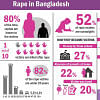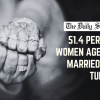Creating safe public spaces for women: A collective responsibility

It was Pahela Baishakh, a day that was synonymous with joy and celebration for my family. Each year, my mother would prepare ruti with beef curry, and we would go out for a picnic-style celebration. That year (2012), we decided to go to Ahsan Manzil, and later, I insisted on visiting the Bangla Academy premises. Little did we know, this decision would forever alter our Pahela Baishakh celebrations.
As we were walking towards TSC from Bangla Academy, an unexpected wave of young individuals joined us, most of them carrying vuvuzela horns with seemingly expert ability to make them blare. Within moments, they were all over us, separating me from my family. I was molested by the mob, and amid the chaos, my screams were lost. In the tumult, I spotted my youngest sister, merely six years old at the time, being jostled by the crowd. While attempting to shield her, I carried her in my arms. The mob, taking advantage of that, attempted to strip my clothes off. My mother, my younger sisters—all of us were molested that day, in broad daylight, in a public place. Although I have chosen to spare my readers from the harrowing details of the painful experience, the mob didn't spare us, and neither did the scar left by that incident. It remains one of the most traumatic experiences of our lives, and since that day, we have never dared to celebrate Pahela Baishakh or, to say, any other festivity at any public place again.
Even now, the mere thought of entering a crowd sends a chill down my spine. Despite being an outgoing person who is interested in public events, book fairs and concerts, anxiety takes over whenever I find myself at a public gathering.
The most tragic and heartbreaking part is, I am not alone.
In a world where women are increasingly outgoing due to heightened social awareness and financial independence, being groped at public gatherings still remains a regular occurrence. It brings us to the question: are we failing to provide them with the safe space they deserve? If yes, why?
Statistics reveal a disheartening reality: girls and women often face harassment, assault and intimidation in public spaces. Sexual harassment and other forms of sexual violence in public spaces, both in urban and rural settings, are an everyday occurrence for women and girls in every country around the world. According to a 2021 survey in the UK conducted by UN Women, a staggering 97 percent of women aged 18-24 years reported having experienced sexual harassment in public spaces. The pervasive issue of women's safety in public spaces arises from a complex interplay of societal attitudes, gender norms, and a lack of effective policies.
This reality reduces women's and girls' freedom of movement. It reduces their ability to participate in school, work, and public life. It limits their access to essential services and their enjoyment of cultural and recreational activities, and negatively impacts their health and well-being. Although domestic and workplace violence is now widely recognised as a human rights violation, sexual harassment and other forms of violence against women and girls in public spaces are often neglected, with few laws or policies in place to prevent and address it.
Yet, amid all these concerns, I must also recall my positive experiences. In 2018, Bangladesh witnessed two national movements: the Quota Movement and the Road Safety Movement. I was an active participant in both protests, and I frequented TSC of Dhaka University to join the demonstrations. You might be surprised to know that, never, for once, did I feel unsafe amid the crowd. The gathering wasn't exclusive to Dhaka University students; people from various institutions and places gathered at TSC. Remarkably, there were no reports of gender-based violence during these movements. So, what conclusion can be drawn from the experience? Only the socially and politically conscious youth are capable of creating a safe space for women?
The dichotomy of my contrasting experiences prompts reflection on the factors contributing to the safety of public spaces. It's evident that collective consciousness, awareness and unity can transform public spaces. As we navigate the persistent issue of harassment, it's vital to amplify the voices of survivors, reshape societal norms, and demand accountability. It's time to prioritise the safety of every woman, ensuring they can navigate public spaces without the looming shadow of trauma.
Creating safe and empowering public spaces demands a multidimensional approach. Besides the necessary measures like implementing stringent laws against perpetrators, ensuring comprehensive education and awareness campaigns, encouraging bystander intervention, and establishing safe reporting mechanisms, we need to, first and foremost, start with table conversations. The path to transformation starts with acknowledging the problem, holding open conversations, and collectively working towards a safer and more empowering future for women. Creating safe and empowering public spaces for girls and women is a collective responsibility, after all.
The success stories of initiatives like UN Women's Safe Cities and Safe Public Spaces for Women and Girls provide a blueprint for change. Local regulations against sexual harassment, gender-responsive urban planning, and community engagement have proven effective in several cities worldwide. The positive experiences of safety during movements like the Quota Movement and Road Safety Movement showcase that change is possible when communities unite. Let us commit to creating a society where every woman can participate in public events without fear, and where festivities can be joyously celebrated by all, unmarred by the spectre of harassment.
Mahiya Tabassum is sub-editor at The Daily Star.
Follow The Daily Star Opinion on Facebook for the latest opinions, commentaries and analyses by experts and professionals. To contribute your article or letter to The Daily Star Opinion, see our guidelines for submission.

 For all latest news, follow The Daily Star's Google News channel.
For all latest news, follow The Daily Star's Google News channel. 











Comments